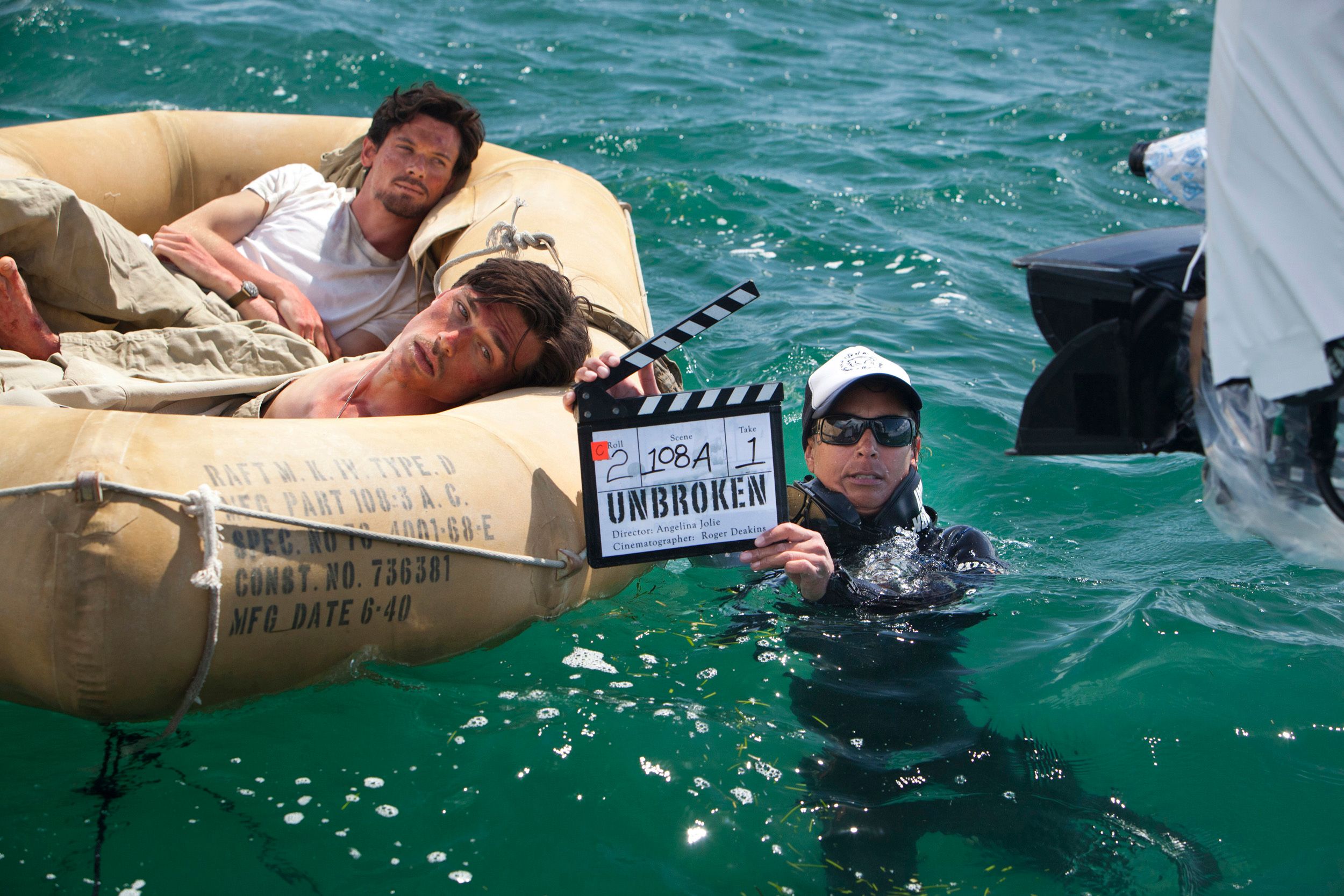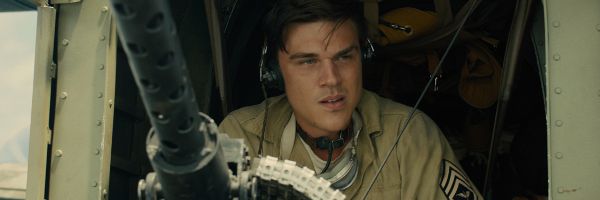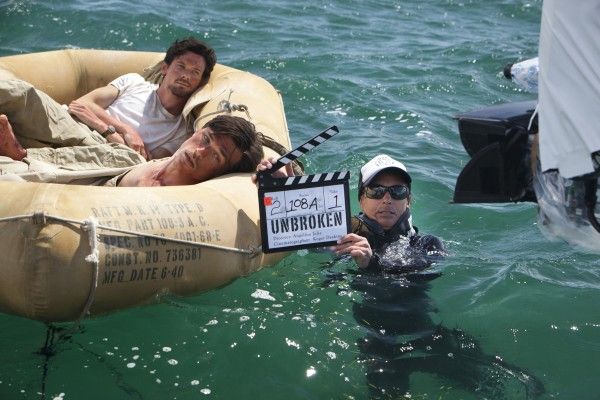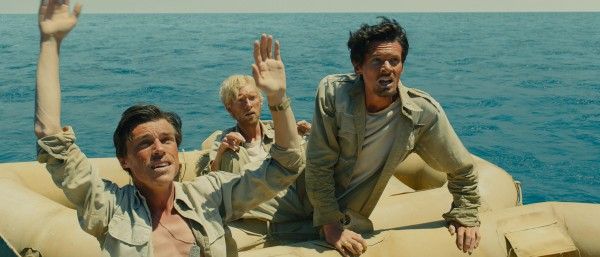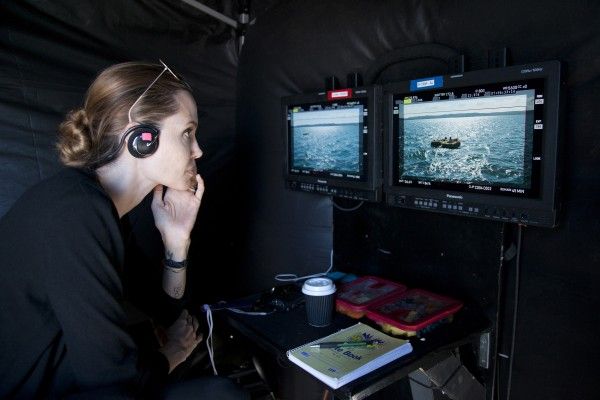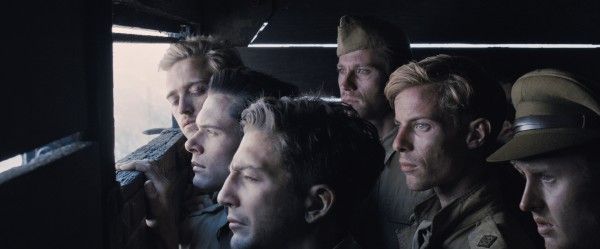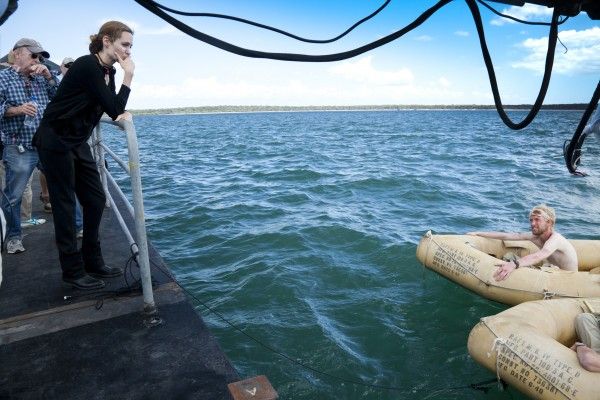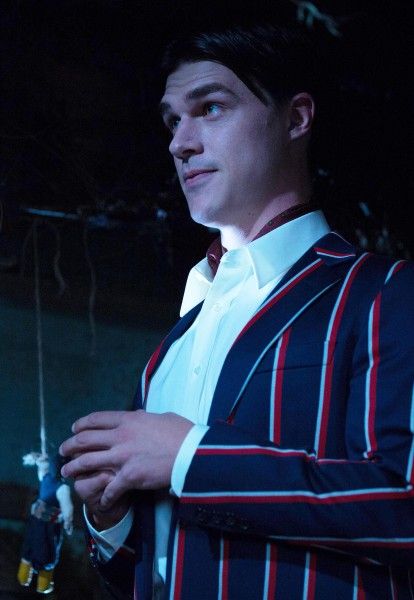Now playing in theaters is director Angelina Jolie’s Unbroken. The film tells the incredible true story of Louis Zamperini (Jack O’Connell), a former Olympian and WWII bombardier whose plane crashed at sea in 1943. Zamperini and two crewmates floated adrift for 47 days and 2000 miles, eventually finding themselves caught by the Japanese Navy and sent to a POW camp where Zamperini was targeted by a sadistic overseer. While Unbroken could have ended up a movie of the week on Lifetime, Jolie has crafted a film worthy of your time and money. For more on Unbroken, check out six clips, the trailer, and all our previous coverage.
At the New York City press day I landed an exclusive interview with Finn Wittrock (who plays Mac, one of the people that floated adrift with Zamperini). He talked about making the film, the challenges of working when you're starving, if the script changed during production, the way he likes to work, collaborating with Angelina Jolie, working with Mike Nichols on Broadway, co-writing The Submarine Kid and what it's about, future projects, and more.
Collider: When you look back on making this movie, was there are a day or two you were on set that maybe something crazy happened or something you'll always remember from this shoot that when people ask what the shoot was like you always jump back to that?
FINN WITTROCK: I remember one of the very first days of shooting, I think it was the first day, we were on the open water, and we only had two days actually on the open water, the rest was in a water tank, but it got really choppy on the ocean. We were starving, and the camera boat was rocking, and our little raft was bobbing up and down on the waves, and there's scuba divers there that have to be there in case we get flipped over. I just remember thinking, "Okay, this is a good way to start." Also because we were under water we had to take diving classes, we had to get scuba certified. Domhnall and I did it together, and we had no energy at all. We'd pass certain tests of swimming laps back and forth and putting on the water tanks and the poor instructor was like - we're supposed to do eight laps and we did three and we're like dying. He's like, "Okay, that's enough, let's move on." But we went down to the bottom on the final day, and we were so dead, we saw two grey nurse sharks, so that was cool.
So you're trying to say that it's not all imagination or fake when you're making a movie?
WITTROCK: It's not fake. It is imagination. We were all doing an approximation of what those guys actually went through, and there is a lot of imagination involved. We were in a tank most of the time with a roller coaster behind us, because it's near a theme park, so we had to imagine that was on the open water. There's a lot that goes into it, a lot of imagination that goes into it, but you're just trying to go as deep as you can go emotionally and push yourself as far as you can physically and just do the story justice.
From when you got involved in the project to what people are seeing on screen, did a lot change along the way in terms of the script? Or is it pretty much what you were told going in?
WITTROCK: I know that the cut of it used to be a lot longer. I think there was a three hour cut at one point. And of course I'm sure people will say, "There's this part in the book that's not in the movie." There's a lot, but I was really impressed how Angelina cut together the inner story of it. For as sprawling and huge an epic it is, it's kind of quiet in a way and about the nuances between people. I think some dialogue was stripped away in the editing of it to sort of purify it and make it live without words.
I think she did an excellent job cutting between - because it's hard when you're trying to tell someone's story to make everything work and show, because he went through so much.
WITTROCK: Yeah, exactly. And it doesn't end where the movie ends. He goes home and there's a whole other movie to be made, what happens to him after that.
It's absolutely crazy. Talk about the way you like to work as an actor versus the way Angelina likes to direct. Specifically, are you someone who likes to do two or three takes and she likes to do a lot, or does she want to do a few and you want to do a lot?
WITTROCK: She's pretty economical, I will say, in her takes. If she feels like she's got it, she'll move on. I'm not one who wants to over do it and do it to death, but I have to trust the director. I have to feel like I'm in good hands so that when they say, "We got it, let's move on," I'm not like, "Uh, I don't think that's the right way to go." That I don't do something my instinct doesn't believe in, but that was never the case. She trusted our instincts and she wanted our input, and she wanted our thoughts. She wanted us to be creatively invested in it, so we had ownership over it. I really dug the way that she worked. It's very actor friendly, it's very thorough, and it's very explorational. Let's find out what it is together.
How many times did you say "I need one more take"?
WHITTROCK: [Laughs] I don't know if I ever did...Oh, just once! Just once, I remember. In the very very first crash scene. It was a tricky thing to get to the point of "we're all going to die here", and I didn't feel like I had quite done it and I was like, "I need to do that again." I think it pieced together right.
Was that last take the one that she used?
WHITTROCK: I think so.
So you were-
WHITTROCK: So I was right! [Laughs] It's always a triumph.
You never know.
WHITTROCK: You're always at the mercy of the editor, for sure, in a big way.
That's what I was going to talk about. A lot of people don't understand that when you're on set, you might do eight different versions of that scene and you don't know what the hell you made until you see that cut.
WHITTROCK: Totally, and it's really frustrating when you're doing it and the director will be like, "Can you just do it this one way?" And you're like, "I really don't like it. I really don't want to do it that way." And then you try it, you do one for them, and then of course that's the one they use. That never happened with this. What I saw on screen was pretty much the essence of what I had actually done, and I think that's true for everybody.
From when you first started out as an actor to where you are right now, how has your process changed, if at all, in preparation for a role or the way you like to work?
WHITTROCK: That’s a good question. Well, you know, I went to Julliard and that probably made the bulk of my technique of what I know now, and then I did Death of a Salesman with Mike Nichols, which I think really opened me up as an actor. I thin the process I had before that was maybe more cerebral, trying to always think it through, and after Salesman it was like some well in me was opened thanks to Phil Hoffman and Mike Nichols, mostly, that since then has been able to carry me. I felt like if I don't know what it is intellectually I can still give it a go and see what my gut wants to do.
Sure, I definitely was going to ask you about working with him. What was that experience like? Because, listen, it's Mike Nichols, you know?
WITTROCK: He was like a grandfather to me. [Laughs] He would say to me, "Don't forget, young man, that you were in the gutter when I found you." I was like, "Mike, I was doing a play off Broadway by Tony Kushner, but yeah, you can call it the gutter, whatever you want to say. I'll credit you with my whole career. I'm happy to do that." No, he was the best. He was the best. There's not enough you can say about him. He was like an old, classic wit. He was like a wit that we don't make anymore. He was so smart and his humor was so refined. He would be really warm. And the cast kind of became a family, and that was the point. I think that was what he said one of the first days. He's like, "We have to become a family to pull this play off." And we did. I think he worked with a very light touch, but...I don't know. [Laughs] It's hard to put into words. I think he was the person who actually coined the phrase "Casting is 99% of your work." And actually, I have to say, Angie I think feels that way too. You spend the most time getting the right cast together and then you know that you've got the right jigsaw pieces in the right puzzle, and then you kind of trust them to carry it. And we had, of course, Phillip Seymour Hoffman as our leader, so we were in pretty good hands.
I definitely want to know if you can talk a little bit about The Submarine Kid.
WITTROCK: Oh, cool! No one's asked me about that.
This is why I get paid the big bucks.
WITTROCK: Yeah, it's a movie that's very close to my heart.
Didn’t you co-write it?
WITTROCK: Yes, I wrote it with my best friend Eric Bilitch and I was the lead in it. We've been writing it since we were in college.
So it's a passion project.
WITTROCK: Yeah, it's definitely a passion project and for years we were trying to pitch it around and get money for it, and my friend Monica Raymund and my producer Deborah Del Prete, we begged and we pleaded and we pounded the pavement and got the money to do it and we shot it in April. And I'm really, really proud of it. We're doing the festival circuit, so knock on wood.
That's awesome. What's the one-liner of what it's about?
WITTROCK: Yeah, a marine returns from war and is suffering from sever PTSD, he meets a girl and they have kind of immediate passionate love affair and she winds up drowning in a lake after a crazy night. He's with her and after that point he becomes obsessed with immersing himself underwater to the point of near unconsciousness, and then he's sort of transported to a paradise world with her.
Ok...that was not at all what I was expecting.
WITTROCK: [Laughs] Yeah, you thought it was about submarines?
No, I just thought it was something else completely.
WITTROCK: Basically the tagline is the closer he gets to her - that's not the line [Laughs]. The more he wants to stay with her, the closer he gets to death. And then we learn that the girl may or may not be real, and there's a whole other backstory. So yeah, it was a lot of moving parts. Writing a screenplay is all twisting, and turning, and shaping, and crafting, and writing, and rewriting, and rewriting.
I've never heard that before. That's crazy talk.
WITTROCK: [Laughs] Yeah, but I think we made the movie that we wanted to make. So knock on wood.
That's awesome. Obviously I want to ask you what you have coming up after that. Are you reading scripts?
WITTROCK: Yes, I am reading scripts. I actually don’t know what I'm doing next. I'm still finishing American Horror Story, which I'm in the heat of.
I heard that show's popular.
WITTROCK: Yeah, some people seem to watch it, which is cool.
One or two.
WITTROCK: Yeah, so we'll be done filming the end of this season soon, and then Submarine Kid will hopefully be out soon, and there's a movie called My All American that I shot over the summer in Austin. It's a football film, a true story. So that should be out next summer, I think.

